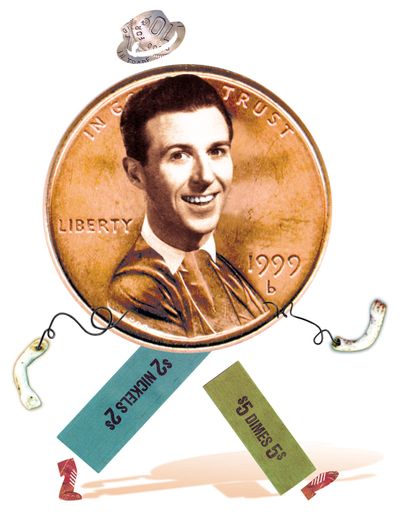Shaky economy can be learning tool
Great time to teach kids to be fiscally responsible

If there’s one bright side to this country’s growing economic crisis, it may be that it’s forcing parents to sit down and have the talk with their kids.
No, no. Not that talk.
This conversation is about dollars and cents, not birds and bees. But it’s no less important.
“The way you raise fiscally responsible children is by not making money this thing that’s shrouded in mystery,” says Mir Kamin, a 37-year-old mother of two in Athens, Ga. “If more people did that with their kids, we wouldn’t be in the mess we’re in now.”
Even before this financial meltdown, Kamin, who runs the money-saving Web site WantNot.net, taught her kids to live frugally. At the grocery store, her 9- and 10-year-old look for sale items and stock up on in-season produce, she says.
Each week, the children must save and donate a portion of their allowances to charity. And, Kamin says, “If you ask my kids how credit cards work, they will explain it to you. They can also tell you never buy anything on a credit card you don’t have the money for.”
It’s the kind of conversation experts say more parents should have in coming months. Even the youngest of children can sense their parents’ stress about the economy and start to worry, says Catherine Solheim, a professor in the Department of Family Social Science at the University of Minnesota, who teaches personal and family finance.
It’s important for parents to discuss the financial crisis, especially with older kids, says Mark Schug, a professor emeritus with the University of Wisconsin-Milwaukee Center for Economic Education. But do so in a way that won’t cause them to panic or lose sleep.
“It’s good enough for young kids to know we may be in for a bit of an economic downturn and they’re not used to that,” Schug says. “They would have no memory of a time when the American economy was in a little bit of a rough patch.”
Debbie Moors’ family in Berthoud, Colo., is already feeling the squeeze.
Gary Foreman, editor and publisher of frugal-living Web site the Dollar Stretcher, says he’s heard from some parents looking to cut child-related costs, but not in great numbers.
“We have had a few people indicate that what they would’ve considered routine extracurriculars last year, this year, they’re giving it more thought than usual,” says Foreman, who works in Bradenton, Fla. “I don’t expect ballet classes and little leagues to be empty in the next couple of months … Parents are more likely to cut out a couple of Starbucks.”
That’s not to say there aren’t tough choices being made. For Kamin, a gas shortage in the Southeast is teaching the family to conserve every gallon.
The Dollar Stretcher recently posted an article about how to budget creatively to fund after-school activities.
Among the tips: Ask the child to donate some rarely used toys for a fund-raising garage sale. Ask relatives to give to a “sports fund” instead of giving birthday or holiday gifts. Have kids hand over part of their allowance to pay for activities.
“In a way, this is good for the children,” Foreman says. “It’s good for kids to understand that their little league or their piano lessons have a cost. These things are not free. Somebody has to pay for them. It’s good for them to understand that expenses have to be put in context of the family budget, and when money is tight, something has to be cut.”